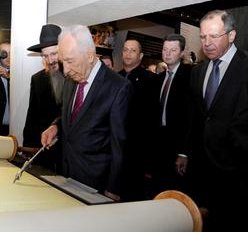The Jewish Museum and the Center of Tolerance open in Moscow.
8 Nov 2012“This museum is an eloquent declaration of the principles of tolerance toward people and their freedom,” said at the inauguration Israeli President Shimon Peres, 89, who was born in what is now Belarus before his family settled in Palestine in the 1930s. Peres recalled that both his parents had been born in the Russian Empire and everyone at home spoke “Yiddish, Hebrew and Russian”, while his mother had sung him Russian songs. “Here we can see man part with the past and move into the future with hope.” “The museum tells us about two ideologies – communism and Zionism,” he added. 
President Vladimir Putin hoped the new museum would become “a place for dialogue and agreement between peoples,” said a statement read at the ceremony by Lavrov. “Any attempt to review the contribution of our country to WWII victory or to deny the Holocaust is not just a cynical lie but a forgetting of history,” Putin’s statement added.
The idea of establishing the museum came from the Federation of Jewish Communities of Russia, which was given the museum building in 2001. Grafts’ renovation and expansion of the 1927 Konstantin Melnikov’s bus depot have transformed the space into the world’s largest Jewish museum. The museum occupies over 8,500 square meters on the Moscow Bakhmetyevsky Garage which was formerly an art gallery run by socialite Dasha Zhukova.
The museum aims to demonstrate Jewish cultural traditions and customs and also show the history of Russia through the prism of one ethnic group, organizers say.
Like its ‘twins’ in New York, Paris and Berlin, the Moscow museum highlights historic Jewish documents, photographs and letters spanning a period of more over two centuries.
Jews were repressed in Tsarist times when starting in the late 18th century they were largely forced to live in an area of the western Russian empire known as the “Pale” where many lived in impoverished towns known as shtetls.
Hitler‘s armies in World War II then occupied most of today’s Belarus, Ukraine as well as western Russia, leaving Soviet Jews exposed to the full brunt of the Nazi killing regime.Heavily targeted during the 1930s purges, Jews suffered even after World War II in the USSR under Stalin’s rule, especially when the purported discovery of a so-called “doctors’ plot” against him unleashed a wave on anti-Semitic hysteria.
Nonetheless Jews have over centuries made a huge contribution to Russian culture, ranging from the writer Sholem Aleichem, the Vitebsk-born artist Marc Chagall or the poet Osip Mandelstam who died in the Stalin camps.
Sources: Ria Novosti, EJR.
Comment Form
Welcome
We are a group of long experienced European journalists and intellectuals interested in international politics and culture. We would like to exchange our opinion on new Europe and Russia.
Categories
- Breaking News (11)
- CIS (129)
- Climate (2)
- Energy&Economy (115)
- EU Eastern Dimension (85)
- Euro 2012 – Sochi 2014 – World Cup 2018, Sport (43)
- Euro-Integration (135)
- History Culture (198)
- International Policy (261)
- Military (74)
- Interviews (18)
- Italy – Italia – Suisse (47)
- Odd Enough (10)
- Poland and Baltic States (126)
- Religion (31)
- Russia (421)
- Survey (4)
- Turning points (4)
- Ukraine (176)
- Российские страницы (113)
Archives
- November 2020
- October 2020
- September 2020
- August 2020
- July 2020
- May 2020
- April 2020
- March 2020
- January 2020
- December 2019
- November 2019
- October 2019
- September 2019
- August 2019
- July 2019
- June 2019
- May 2019
- April 2019
- March 2019
- February 2019
- December 2018
- November 2018
- October 2018
- September 2018
- August 2018
- July 2018
- June 2018
- May 2018
- April 2018
- March 2018
- February 2018
- January 2018
- December 2017
- November 2017
- October 2017
- September 2017
- August 2017
- July 2017
- May 2017
- March 2017
- January 2017
- December 2016
- November 2016
- October 2016
- September 2016
- July 2016
- June 2016
- May 2016
- April 2016
- February 2016
- January 2016
- November 2015
- October 2015
- September 2015
- June 2015
- April 2015
- March 2015
- February 2015
- January 2015
- December 2014
- November 2014
- October 2014
- September 2014
- August 2014
- July 2014
- June 2014
- May 2014
- April 2014
- March 2014
- February 2014
- January 2014
- December 2013
- November 2013
- October 2013
- September 2013
- August 2013
- July 2013
- June 2013
- May 2013
- April 2013
- March 2013
- February 2013
- January 2013
- December 2012
- November 2012
- October 2012
- September 2012
- August 2012
- July 2012
- June 2012
- May 2012
- April 2012
- March 2012
- February 2012
- January 2012
- December 2011
- November 2011
- October 2011
- September 2011
- August 2011
- July 2011
- June 2011
- May 2011
- April 2011
- March 2011
- February 2011
- January 2011
- December 2010
- November 2010
- October 2010
- September 2010
- August 2010
- July 2010
- June 2010
- May 2010
- April 2010
- March 2010
- February 2010
- January 2010
- December 2009
- November 2009
- October 2009
- September 2009
- August 2009
Our books




